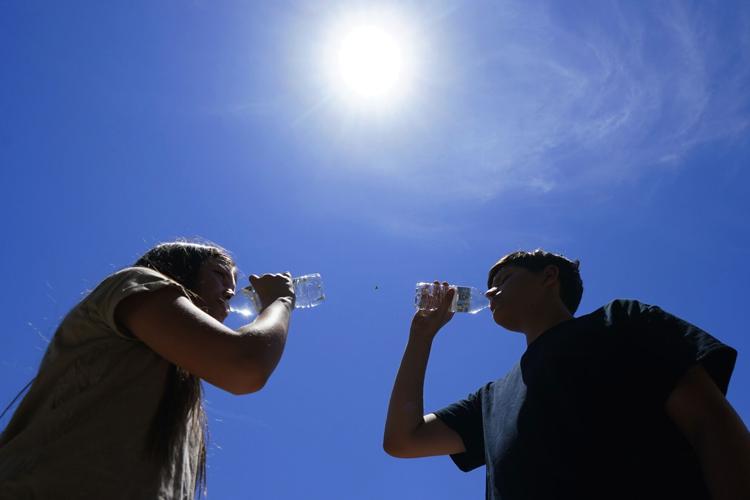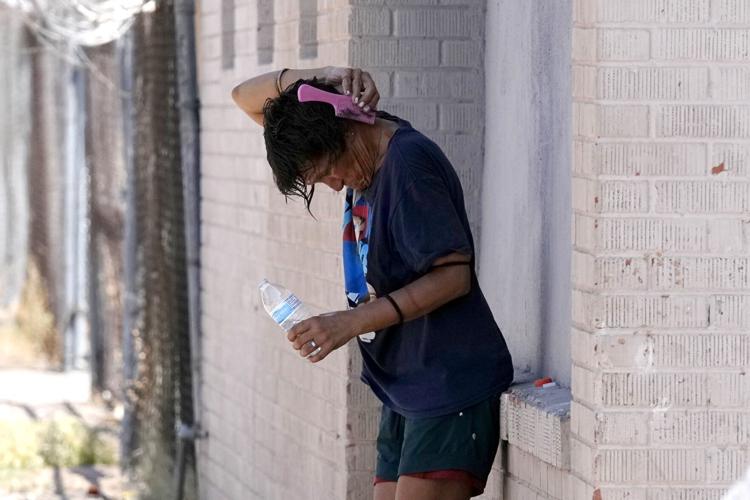Summer may not have been the hottest on record everywhere in the U.S., but in places that normally have hot summers, the heat was relentless.
Data from NOAA this week indicated that summer 2023 — the three hottest calendar months of the year — was the 15th hottest on record nationally.

Tony Berastegui Jr., right, and his sister Giselle Berastegui drink water July 17 in Phoenix.
Locations that already have hot summers — from New Mexico to south Texas, eastward across the Louisiana and Florida Gulf Coasts — did have their hottest summer on record. This includes the major population centers of Houston, Tampa Bay and New Orleans.
One area spared from a hot summer was the Ohio Valley, as that part of the country was cooler than average. However, none of the states sharing a border with the Ohio River had one of their 25 coolest summers on record. West Virginia was the coolest of that group, in 32nd place.
Summer rainfall had much more variation nationally — even over shorter distances. California and Nevada had one of their 10 wettest summers, while Arizona, New Mexico and Texas all had one of their ten driest summers.
Louisiana was also especially dry, with the lack of rainfall worsening the heat this year and contributing to their hottest summer on record.
Interactive: Extreme weather records for the U.S.
Summer was not just hot on land. The oceans received much more attention this year, as they reached their hottest level on record. Included within those waters is the Gulf of Mexico, so sea breezes moving inland to cool down New Orleans and Tampa did not offer much relief this year.
Specifically measuring the impact of the warming climate to temperatures this summer is challenging. However, examining the national period of record back to 1895 provides some perspective. Nationwide, only 3 of the 15 hottest summers on record came before the start of the 21st century: 1934, 1936 and 1988. In effect, the summer of 2023 was still warmer than 97 percent of the 20th century summers in the United States.
Interactive map: Recent U.S. temperatures compared to 100-year average
In addition to the warming climate constantly humming in the background, there is building evidence suggesting that jet stream patterns, which govern how weather systems move, are becoming slower to change in the shorter term. The end result is that a particular weather pattern persists longer than it did a couple of generations ago. Louisiana jumps into this fray once again, as Shreveport had 11 consecutive days that were at least 105 degrees, exceeding the previous record by four days.
A statistical analysis from the non-profit Climate Central examined the likelihood of the higher temperatures occurring this summer in the background of the warming climate. Reviewing the temperatures at 244 cities nationwide, they found that 71 percent had at least a week with temperatures twice as likely to happen in the warming climate.
Expressing this likelihood as the Climate Shift Index, the data analysts at Climate Central found even more of an impact in some of those same cities along the Gulf Coast.
Houston had 63 days this summer when the high temperature reached a level that was three times more likely in the warming climate. Tampa had 60 such days, New Orleans had 52.
While the warming climate may not have caused the heat at any particular site, it makes it more likely. Much like replacing lower numbers on a roulette wheel with higher numbers, cooler days will still happen, but they become much less common. And hotter days will become much more frequent.
The hotter weather increases the incidents of heat illness, especially for people who work outside — from construction workers in urban areas to farm workers in rural areas. Meteorological fall may have started on Sept. 1, but in most of those same places, it was the hottest first week of September on record.
Cooler days and evenings of fall are coming, but as the climate continues to warm, sweater weather will be arriving progressively later in the calendar than in generations past.
In that way, summers are getting longer.
Sean Sublette is the chief meteorologist of the Richmond Times-Dispatch in Virginia.

A person tries to cool off in the shade July 18 in Phoenix.








